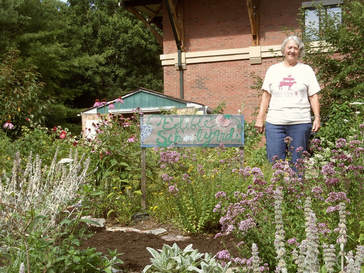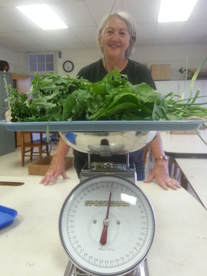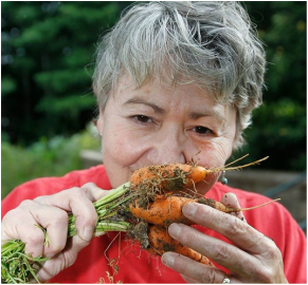|
On June 16, 2016 Jessica Pierce and Amanda Carlton of Blue Ridge Women in Agriculture interviewed Debbie Bauer, a community member, seed saver and leader of the Bethel School gardens. Debbie has a long history in Boone and has worked to develop many programs with Bethel School as well as the seed library to educate others on seed saving and gardening techniques.
 of those two things tomatoes are really susceptible to blight and disease. One of the things I started doing was growing some that are early bearing so that I might get some tomatoes, because the blight usually hits really late in the summer. That's one of my strategies. Amanda: What is your favorite way to cook it, or how would you tell someone to cook it? Debbie: Just eat it right off the vine! But, I do can tomatoes. I also make some salsa. That's fun too! Amanda: Is that hard? Debbie: No! Not at all! Actually I do water bath canning, which to me is a little easier than pressure cooking, but with plants that have high acid, or even with tomatoes that don't have high acid you can add some lemon juice and can them and they are fantastic in the winter for chili and stew. Jessica: Did your family have a garden when you were growing up, or how did you start gardening? Debbie: As far as I can ever remember--all the way back to when I was a kid in Indiana, and we moved to Florida when I was five--my grandmother always had a garden and she is really who I learned from. I didn’t really start gardening until I was in my late twenties. I will say too, at home we had a little backyard garden, my mother always had some tomatoes in there and lettuce, stuff like that. But for me personally, it wasn’t until I got a little bit older and had my own home. That’s when I really started gardening. Jessica: Can you share one of your favorite stories about gardening? Do you have a pivotal memory? Debbie: Well, my very first memory that I have is eating right off the vine tomatoes in Indiana in my grandma’s backyard. If you haven’t had an Indiana tomato, they are the best! At one time Indiana was under water. You can go to a place there now that's called falls of the Ohio and when they lock the dam you can walk on a actual prehistoric coral bed. With the addition of that and the soil there, the tomatoes are really acidic and… I don't know what it does to them, but they’re great. Amanda: Would you say it’s almost better than a High Country? Debbie: It is definitely, I have never had a better tomato than the ones in Indiana. It's probably because I was born there, but yeah, that's a good memory, that's probably why they're my favorite. Jessica: How long have you been in the High Country? Debbie: I have been here 21 years. Dave: Have you always had a garden here? Debbie: I have. When I moved here the first thing I did was put in a little garden. The property that we have happens to have a lot of shade, so I only have a small garden there. But, it's really nice that I also have one at Appalachian State and I am the garden coordinator at Bethel School, so I always have plenty of stuff. Even though I have a small space at my house, I have all of my tomatoes in 5 gallon buckets and I have 32 plants, which is kind of ridiculous...I'm doing an experiment this year, they’re all dwarfs and determinants. The dwarfs are pretty early bearing and the determinants, they don’t get big like the indeterminant heirloom tomatoes. So, they are easier to grow in a bucket and I don't have that much room in my garden. I took a lot of tomato growing advice from the book, Epic Tomatoes by Craig LeHouiller. Dave: What’s your favorite tomato? Debbie: Oh, my gosh I like so many! The Red Cherokees are awesome, any of the Cherokees are really good tomatoes, very good tasting tomatoes. Amanda: Why do you save seeds? Debbie: I started really only about 5 years ago saving seeds. It was two fold. It’s something you can do yourself, but it also saves money. I just thought about my son who was starting organic gardening in Florida and so I started saving seeds for him from some of my favorite things that I like to grow. Amanda: What kind of seeds are you saving? Debbie: I'm saving tomato seeds, squash seeds, cucumber which is kind of iffy because usually you grow more than one kind of cucumber or squash--they do cross pollinate. This year I'm growing only one type of cucumber so I can save the seeds to be sure to get the same type of vegetable. I also like to save cilantro seeds. Those are very easy to save. Amanda: How did you learn how to save seeds? Debbie: Well when I first started saving seeds I knew nothing. I just started saving them. So I was kind of lucky that some of them did actually last and grow. But then, I found out about seed libraries and started buying books and reading them and going online. There is so much information. I’ve also gone to some workshops. Jessica: Can you tell us why you think seed saving is so important? Debbie: I think, one reason is to save money and grow your own food. The other is saving seeds that do particularly well in our area. I like to save those because I know I'm not going to have trouble with this tomato, or this bean or whatever with disease since our climate is a little cooler here. I also like to give them away. Jessica: How do you think GMOs (Genetically Modified Organisms) threaten seed diversity? How do you think GMOS play a role in seed saving? Debbie: I don't know for a fact if it causes health problems, but I mean that's a big possibility. Also if we can't keep a diversity of vegetables, herbs, and flowers, then if anything happens, if you have no diversity, once it goes it's gone.  Jessica: Why are organic gardening practices so important and how to do you like perpetuate those practices? Debbie: I like to be able to go out to my garden and eat it right off the vine and not have to worry about pesticides or chemicals or anything like that. I teach kids and we grow organically at Bethel Elementary school. I like for them to be able to do that too and their parents not have to worry, or me or anyone else. You know where your food comes from, you know what you put in the ground, you know it doesn't have pollutants in it. I’ve done an organic gardening workshop at the library and I'm going to do another one at Valle Crucis Park. I promote organic gardening very highly. Amanda: What's your favorite part of gardening and seed saving? Debbie: You know it even just walking up to the garden and looking at it. I mean the day before yesterday it's “my beans and cucumbers are up!” so it's therapeutic. I'm always thrilled every summer because I save so much money and eat wonderful food. It’s a really satisfying thing. Jessica: Have you participated in the seed swap or given someone seeds? Debbie: Yeah! I have gone to the Ashe County Seed Swap a couple of times. Because I just do it for personal use I never have a lot. But I have some seeds here I will be saving, which are the beans I’m growing, now, they are Betty Sue Parker beans, they're a grea(Z)y bean, that William Ritter gave me. It’s a green bean, they're actually pole beans, I don't think they get 12 feet high, but instead of being kind of fuzzy on the outside and kind of rough, they are very smooth and shiny. I have never eaten them and I have never grown them so this is my first time. I can't wait because William says they are delicious, he even wrote a song about them SONG - Ode Greazy Bean Jessica: Is there anything that we have missed that you would like to share, that you think we should ask? Debbie: Only that I was on the committee for the Seed Library and I am just thrilled that we have something like that. I am really happy to be working with the kids saving seeds. Several other schools are doing the same thing. I received a grant from High Country Local First to build a new raised bed that will be only for seed saving at Bethel School Garden.
4 Comments
2/18/2019 04:16:50 am
Agriculture is the path that I choose to journey through. What I am saying here, is that it is my major during college. Some people think that this is not the most practical things to do, however, I believe that it is. Agriculture is one of the most important part of a country. Agriculture is the backbone of any country really. I mean, we are able to feed our people through agriculture, we also get to expand our reach through trading.
Reply
8/30/2019 10:20:47 pm
Tomato blight refers to a family of diseases caused by fungus-like organisms that spread through potato and tomato foliage, particularly during wet weather. Blight spreads quickly, causing leaves to discolor, rot and collapse. I like tomatoes in salsa and partner it to fried fish. I ate a lot every time we had these two on our table but I also like eating it fresh and sometimes I add fresh onions too. Tomatoes are very nutritious and it is good source of the antioxidant lycopene that reduced risk of heart disease and cancer. They are also a great source of vitamin C, potassium, folate, and vitamin K.
Reply
10/20/2023 08:13:00 pm
tomatoes are great source of vitamin c. they are not only delicious but also packed with essential nutrients. adding tomatoes to your diet can help you to boost immune system and promotes overall health.
Reply
Leave a Reply. |

 RSS Feed
RSS Feed